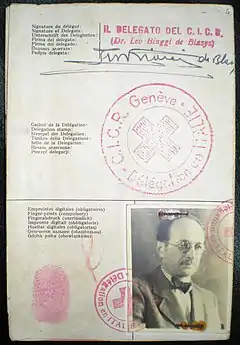Fake passport
A fake passport is a counterfeit of a passport (or other travel document) issued by a nation or authorised agency. Such counterfeits are copies of genuine passports, or illicitly modified genuine passports made by unauthorized persons, sometimes called cobblers.[1] Its purpose is to be used deceptively as if it were a legitimate travel or identity document. A passport obtained from an authorized issuer by providing false information may also be considered fake.


Such falsified passports can be used to leave a country from which exit is barred, for identity theft, age fabrication, illegal immigration, and organized crime.
Other comparable documents include camouflage passports, which are not copies of a valid form of document, but are designed to look like a passport issued by a body that cannot issue legitimate passports, such as "Republic of Mainau", or a "Baltic Trade Mission" diplomatic document. Fantasy passports, such as the World Passport, are passport-like documents issued by non-official organizations or micronations as a novelty or souvenir, to make a political statement, or to show loyalty to a political or other cause.
Incidents
Adolf Eichmann (high-ranking Nazi often referred to as "the architect of the Holocaust") after the end of World War II traveled to Argentina using a fraudulently obtained laissez-passer issued by the International Red Cross and lived there under a false identity.
Alexander Solonik (Russian hitman in the early 1990s) lived in Greece with a fake passport, which he had obtained from the Greek consulate in Moscow.
In October 2000, Alexander Litvinenko (Russian dissident and writer) fled to Turkey from Ukraine on a forged passport using the alias Chris Reid, as his actual passport was confiscated by Russian authorities after criminal charges were filed against him.
In May 2001, Kim Jong-nam, the son of North Korean leader Kim Jong-il, was arrested at Narita International Airport, in Tokyo, Japan, travelling on a forged Dominican Republic passport. He was detained by immigration officials and later deported to the People's Republic of China. The incident caused Kim Jong-il to cancel a planned visit to China due to the embarrassment caused by the incident.[2]
In June 2005, American actor Wesley Snipes was detained in South Africa at Johannesburg International Airport for allegedly trying to pass through the airport with a fake South African passport. Snipes was allowed to return home because he had a valid U.S. passport.[3]
References
- http://www.spymuseum.org/education-programs/spy-resources/language-of-espionage/#C SpyMuseum.org
- Kim Jong-Il's Son Makes Pit-stop in Paris to Get Teeth Fixed Archived 2008-01-16 at the Wayback Machine from www.asianoffbeat.com 15 November 2007
- IOL.co.za